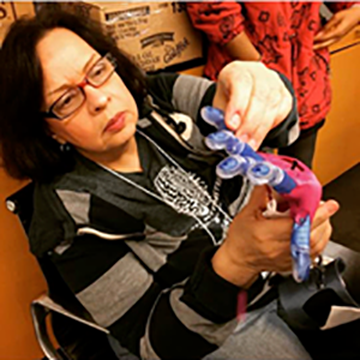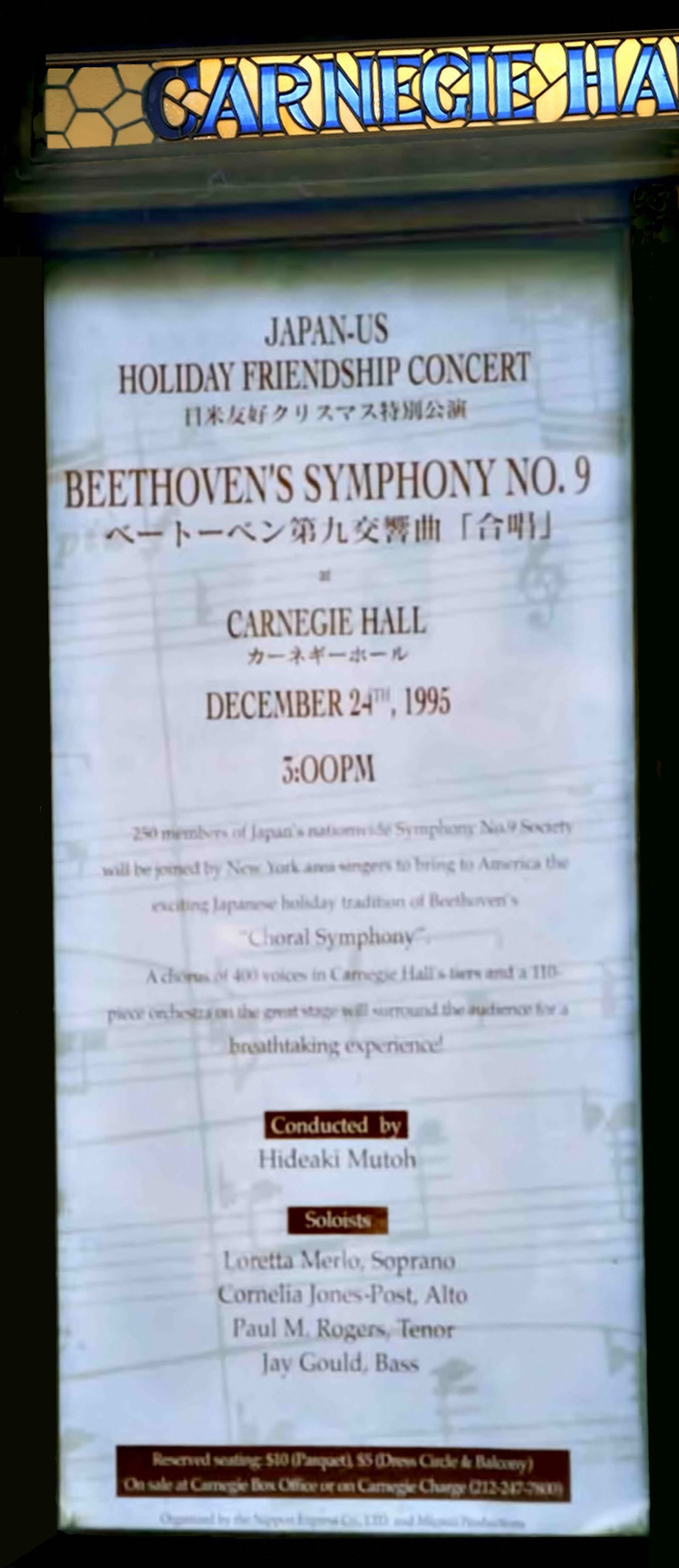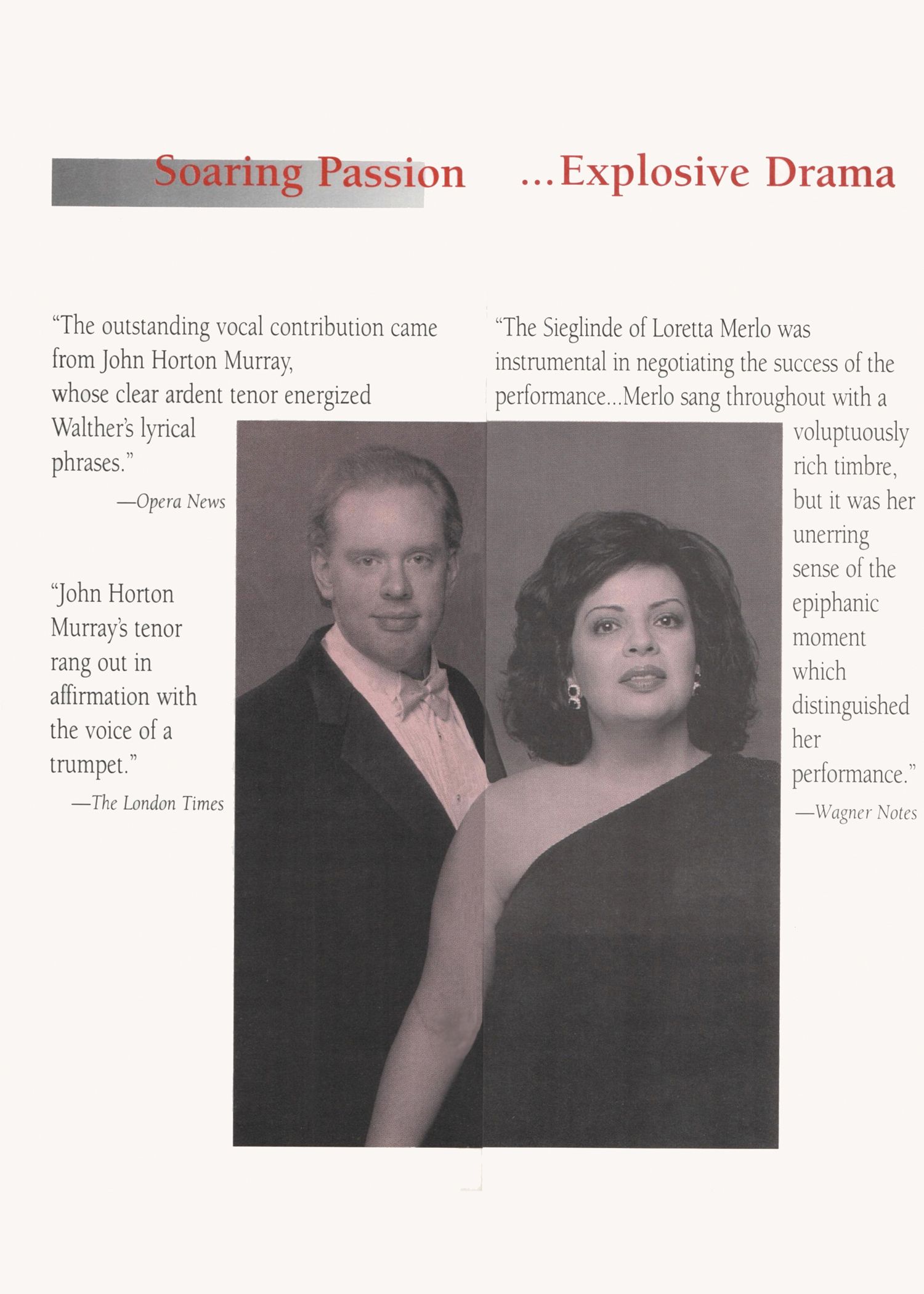If you have ever passed through the doors of Samuel J Wood Library, you have likely been greeted by Loretta Merlo, Manager of Access Services, or one of her welcoming staff. It's also likely that she gave you a hug, asked what you were working on, and suggested helpful resources to further your project. Loretta joined Weill Cornell Medicine nearly 40 years ago as a circulation clerk when she was making her way as a opera singer in New York, and has been providing frontline support for patrons ever since.

Since 1981 – it will be 40 years next year, in 2021.
Yes. It was never my intention to be here this long, but there you have it. Life is what happens when you’re making other plans.
I’m from New York, from Long Island, and I went to school at Syracuse. I was in Binghamton for a while as an apprentice. My original pursuit was to be an opera singer. I was an apprentice with Tri-Cities Opera in Binghamton New York, and I was pursuing a MA in Music History/Musicology at the same time at SUNY Binghamton, and while I was at SUNY I was in a work study program which included doing work in the cataloging department at the Music Library.
Then I moved to New York City to try my luck. I ran all around the city into libraries looking for a job, and had a job for a time at what was called a mercantile library on 42nd street. I lived as an au pair on 69th between 1st and 2nd in one of those brownstones. The kids were pre-teens, so I just had to be there for their comings and goings while the parents went off on very fancy social things. I didn’t have to be there the whole time, so I applied for a job at Weill Cornell because I was just up the block, and was hired as a part-time person in the cataloging dept. The whole time I was there though I knew that the job for me was the one behind the desk. When I was growing up my parents were in business, they owned a bakery, and I used to work there at the counter from the time I was very young, so I knew how to help people and work with people. I always say that I got my training for my job in my parents’ bakery.
When a full-time job in cataloging became available I took that one, but I was always eyeing the job at the desk. That position was the one that I was meant to do. Being an opera singer in New York, even though I did succeed to some degree, wasn’t going to pay the bills, now or then. So, I eyed the job at the desk and when it became vacant I said, “I can do this job.” And I think they were like, “oh great somebody wants it,” because it was a tough job at that time. You were really on the frontline, the gatekeeper, and people got very angry. Getting into the Library was really a challenge for some people and they tried all sorts of things, like fake IDs, to get in and get access to the material because it was all on site. So, no one liked the job, really, and they had pretty high turnover. I was like no problem I can handle this job, and I did, and I really enjoyed it, and over time I was promoted to the head of circulation, which is where I’ve stayed because I really love my job.
Sometimes, it’s like being my living room, people come by and they’re like “oh Loretta how are you?” and they hug me, and I ask “so what are you working on, what projects are you doing?” and I try to say "oh the Library can help you with this," and that’s when I feel really happy and involved and integral in the fabric of the College. The challenges are sometimes very challenging, but I enjoy them a lot. I enjoy being in the midst of it.
I don’t always talk about these things! My two biggest gigs before I threw in the towel were as a soloist in a performance of Beethoven’s 9th symphony at Carnegie Hall. That was thrilling. And I did Aida for Austin Lyric Opera – I was Aida. That was huge. Austin is a B company so that was a big gig.
It was exciting and I got great reviews and I really thought that was going to be the start of something, but it’s just so hard. I was like, I had a 4,000 seat standing ovation, what do mean you want an audition? It’s a very hard business. So, eventually I decided I couldn’t take it anymore and I quit.

The marquee of Carnegie hall for Beethoven’s Symphony No. 9, in which Loretta Merlo featured as a soloist

A promotional brochure with reviews of Merlo’s work
One of the things that was most instructive when I finally quit, because singing was so much a part of who I was, I really thought that there would be a tremendous loss, and there was, it’s a personal loss. It’s greater than leaving a job. But one of the things I didn’t understand then that I understand now is that when you have a creative impulse in you, you find other ways to use it. It doesn’t go away. When I stopped singing my creativity didn’t away, it just started to be channeled into other things. I started to do other artistic endeavors and it filled the void.
The director of the Library at the time, Carolyn Reid, was very helpful in that she allowed me some free reign with some things, because I think she knew that she could maybe use that creative energy in a different way.
It is. That’s the kind of manager I try to emulate.
Well, it all depends on who you talk to! I want to think that my staff loves it. I try to show off their good work as best I can, and also to speak for them. Being in a public service area is really hard. No matter what you’re doing there’s someone that has a criticism of the way you do it. Whenever you have to say no to anything, some people can be very resentful. And my staff is on the front line, they don’t have an office. Their desk is the front desk, and they have to be there and they have to be nice. I don’t think they get enough appreciation for how they hold things together. I have people with hundreds of sick hours who never miss a day, who open the Library on-time every day. They’re always there to help. They have a lot stamina, you can’t undervalue that.
I have people with parents who are ill, who have children, I have someone whose spouse is a nurse right now. You have to hear everyone’s story and you have to be there. The more you understand and the more that you help them, they develop loyalty and peace of mind. You can’t be worrying about something and give good service.
That “happy cows, happy milk” commercial that used to be on all the time – it’s like that. If you treat the staff the way you want them to treat others – the golden rule, so to speak – they have a peace of mind that if something goes wrong, there will be a depth of tolerance and understanding for them as human beings. I hope my flexibility helps them feel good about working here, and that that helps them give good service.
I try to be open minded about how people work. When I’m helping to develop staff, I’m very able to see small increments of improvement. I think it’s from being a singer. When you’re a singer you appreciate very small increments of improvement – like you can now do a phrase to the end without being short of breath, because you’ve trained your muscles through practice and you see the result in these small increments of improvement. So, I can see increments of improvement in a person’s behavior. Sometimes it’s not enough for the people above me, but I know I’m making a dent. One of the biggest lessons in getting older, is that hopefully you become more patient. I try to be more patient – I try to bridge the gap, by holding the people above me at bay and then making a space for people to improve at their own rate. It’s hard to balance that, being a middle manager. Sometimes you just have to say, “I don’t care you have to do this,” but if I don’t have to do that too often, when I do it they know it’s an imperative and they’ll rise to the occasion.
It’s reassuring to work for a place that has the common good at heart. The Library is for the common good – we buy resources for people to share which is very important, and we provide space for the people to share which is very important, and the College and the hospital are for the common good. So that’s one reason I feel very invested. I also love dealing with the students. I have this beautiful picture in my office. A couple of years ago my team was a first place team at the Treasure Hunt. When they won they all went down to the stage. I’m a little limited in how I walk, and climbing those stairs in Uris is very difficult, so there’s a picture where two of the students are reaching out off the screen, and they’re reaching out to me. That was so beautiful, I don’t care if I ever have another winning team. They were it. Is that a good doctor or what?
There is a graduate student Du Cheng who is like my son, he’s so brilliant and he’s so warm and loving that it is like we’re related, it’s the weirdest thing. He called me up one day and said “the babysitter is sick and we have an anniversary dinner planned. Can I leave our baby with you in your office so we can go to dinner?” I said, of course! So, I took care of his baby while he and his wife went to dinner. These are the type of relationships that you can’t quite predict but when they happen they’re wonderful.
I’ve had a therapist for a number of years that I met here who is now in private practice, she’s one of the people I admire most in the world.
I admire Carolyn Reid a lot, she was the Director of the Library when she was here. She was very open. Carolyn and another Library Director, Bob Braude, flew to Austin to see me in Aida. I remember telling my husband, “Carolyn is coming to Austin to hear Aida.” And he said “she comes to all your performances, and I said "yea, but they don’t usually entail a hotel and a plane flight. It’s usually a bus ride to a church." That was very touching.
And for singers, Renata Tebaldi, and Maria Callas – who was a great artist. She was an interesting story in many ways. There have been several movies made about her, and even if you’re not a fan of opera I recommend them. They talk about the struggle women had to be famous, and also to be a woman in society in the 50s. To be a wife, and a mother, and an artist – a successful artist. The stories are very sad sometimes, but instructive, on how to live your life.